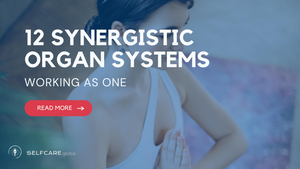“The whole is greater than the sum of its parts.” Aristotle
Yes, you are the orchestration of 12 synergistic organ systems working as one! When one system is out of harmony, you need to treat the whole, not just the individual parts or systems.
The Symphony of Your 12 Organ Systems
Did you know that your body consists of 78 organs that work together within 12 remarkable systems? Each system plays a crucial role in your overall wellbeing, and when one falls out of harmony, the entire symphony of your health can be affected.

To create a human we need 78 organs of differing sizes and physiological functions. These 78 organs synchronize into 12 different systems of the human body; each with its own function to balance the human system:
| # | Organ System | Function |
|---|---|---|
| 1 | Digestive system | Processes foods and absorbs nutrients, minerals, vitamins, and water |
| 2 | Reproductive system | Produces sex cells and sex hormones; ultimately produces offspring |
| 3 | Respiratory system | Delivers air to sites where gas exchange can occur between blood and cells |
| 4 | Endocrine system | Provides communication within the body via hormones |
| 5 | Skeletal system | Supports and protects soft tissues, provides movement at joints |
| 6 | Nervous system | Collects, transfers, and processes information |
| 7 | Lymphatic system | Defends against infection and disease |
| 8 | Urinary system | Removes excess water, salts, and waste products from the blood |
| 9 | Musculoskeletal system | Provides movement, support, and heat production |
| 10 | Cardiovascular system | Transports oxygen, nutrients, and other substances to the cells |
| 11 | Integumentary system | Provides protection from injury and controls temperature |
| 12 | Immune system | Defends against pathogens and other diseases |

What if those persistent health challenges you've been facing—the chronic fatigue, stress, and disconnection—aren't isolated problems, but symptoms of these interconnected systems calling for a harmonious approach?
The 3 Major Challenges We're Here to Solve Together
- The Fragmented Healing Trap: Understanding why treating isolated symptoms rather than whole-body systems leaves you feeling chronically fatigued and disconnected.
- The Gut-Brain Disconnect: Revealing how one system (your digestive system) silently influences your other systems, particularly affecting mental health, energy levels, and overall sense of purpose.
- The Passenger Mindset: Discovering how to shift from being a passenger in your health journey to becoming the conductor of your body's 12-system orchestra.
Would you be open to exploring a different approach to healing that honors all 12 systems as the interconnected marvel they truly are? Join our SelfCare Community where we dive deeper into these connections.
The Story of the Gut: Your Body's Central Intelligence Agency
Not long ago, we held the belief that bacteria had little to do with our well-being and considered it a separate entity that just assisted the digestion of certain foods.
More recently, it has become a fact that humans possess as many bacterial cells as human cells – with over 10,000 species and trillions of microorganisms present in our gut!

The gut and the immune system support one another to promote a healthy body. For instance, the gut microbiome acts as a gatekeeper and a trainer. It teaches immune cells called T-cells to distinguish foreign entities from our own tissue.
The SelfCare Framework: Learn-Do-Embody-Teach
1. LEARN: Your Gut - The Second Brain Controlling Multiple Systems
Have you heard of the Gut-Brain Axis (GBA)? It consists of bidirectional communication between the central and the enteric nervous system, linking the emotional and cognitive centers of the brain with peripheral intestinal functions.
Simply speaking, Gastrointestinal dysfunction can wreak havoc throughout the body; and has been linked to allergies, arthritis, autoimmune disease, chronic fatigue, & more.
A troubled intestine can send signals to the brain, just as a troubled brain can send signals to the gut. Therefore, a person's stomach or intestinal distress can be the cause or the product of anxiety, stress, or depression. That's because the brain and the gastrointestinal (GI) system are intimately connected.
This perspective shift isn't just interesting theory—it's transformative knowledge that challenges conventional approaches to treating chronic fatigue, stress, and that persistent feeling of disconnection from your purpose.
2. DO: Trust Your Gut Intelligence Within Your 12-System Orchestra
We all experience a 'gut feeling' now and then. It could be when you're making a simple decision like what to eat, to something a little more complex like a career change.
Neuroscientist and author of The Source, Tara Swart, M.D., Ph.D told MindBodyGreen "You can't remember everything you have experienced in life, but you do store all this wisdom. Gut feelings are pattern recognition systems designed to keep you safe and well, but sometimes they can hold you back from thriving based on old fears."
But research from Flinders University found gut feelings are actually the product of the Enteric Nervous System (ENS), an intricate network of neurons and neurotransmitters found in and around the gut.
When you begin treating all 12 systems—especially your digestive system—with the reverence they deserve, you're not just addressing digestive issues. You're unlocking communication pathways that can release you from chronic fatigue and reconnect you with your innate wisdom.
Curious about specific approaches that align with your unique body systems? My book Lifestyle Medicine For the People explores personalized practices that honor your body's interconnected nature.
3. EMBODY: The 12-System Harmony Approach
It's important to understand how the 12 systems work together so that we can understand how to help them heal, function optimally, and even perform! It turns out that everything is connected to everything. Like a car that stops, we can't just replace the wheels (bandaid approach) if the wheel alignment is out, or the driver keeps driving recklessly.
When you embrace this whole-system perspective, you begin noticing how:
- Your respiratory system affects your energy and mental clarity
- Your endocrine system influences mood, sleep, and stress resilience
- Your lymphatic system supports detoxification and immune function
- Your cardiovascular system delivers nutrients that power all other systems
- Your digestive system serves as the foundation for whole-body harmony
This embodied understanding transforms how you approach feeling tired, stressed or disconnected. You stop chasing symptoms and start harmonizing systems.
4. TEACH: Share Your 12-System Healing Journey
Knowing where to start is important when addressing your 12 interconnected systems.
Understanding that the digestive system is the gatekeeper between the outer world and the inner world of our cells means that it might be worthwhile to look there first ;)
Especially when gut microbiota can modulate, or tweak, the gut-brain axis, which enables them to influence brain function and pain sensation.
Have you ever noticed how once you discover something truly transformative, you naturally want to share it? That's because teaching others solidifies your own embodiment of wisdom.
Your Next Step: From Disconnection to 12-System Harmony
Researchers are finding that imbalances in the microbiota-gut-brain axis can lead to metabolic and cardiovascular disease as well as certain neurological diseases, depression, and chronic pain.
This means treating mental health challenges, metabolic challenges, chronic inflammatory conditions, chronic fatigue, and chronic pain... Might require a different approach. Or at least a different starting point.
May I ask—which of these 12 systems do you feel might be most out of balance in your life right now? Was it the connection between your digestive system and your nervous system? The relationship between your 12 organ systems? Or perhaps the way disconnection in one area creates cascading effects throughout your body?
Would you be curious to explore a comprehensive framework that addresses all 12 systems? Join our SelfCare Community where we dive deeper into practical approaches that honor your body's synergistic nature.
Remember: When you treat your body as the 12-system marvel it is, persistent fatigue, stress and disconnection begin to dissolve, replaced by the vibrant well-being that emerges when all systems work in harmony.
Key Research References:
Level 1 evidence - Systematic reviews
- Comprehensive reviews on the 12 organ systems and their interconnected functions
- Meta-analyses of microbiome diversity and its influence on multiple body systems
- Systematic examinations of integrative medicine approaches to chronic fatigue
Level 5 evidence - Accredited Health Experts cited
- Tara Swart, M.D., Ph.D, neuroscientist and author of The Source
- Research from Flinders University on the Enteric Nervous System
- Additional insights from experts in functional medicine and systems biology
Other
- MindBodyGreen publications on intuition and gut-brain connection
- Complementary perspectives on whole-system approaches to health
REFERENCES
This is directly referenced from the Amazon best-selling SelfCare Book "Lifestyle Medicine For the People" by Rory Callaghan. If you would like to read more content like this, grab the free online chapters of the book or a hard copy.
We have done our best to reference everyone's expert opinions, peer-reviewed science, and original thoughts, all references available here and referenced in the text.
We also understand that most thoughts are not our own and there is a collective unconsciousness, unconsciousness, and universal mind stream of energy that is always at work. How our references are sorted and filtered is here.
This article is for informational purposes only and should not replace professional medical advice. Always consult with your healthcare provider before beginning any new health regimen.



